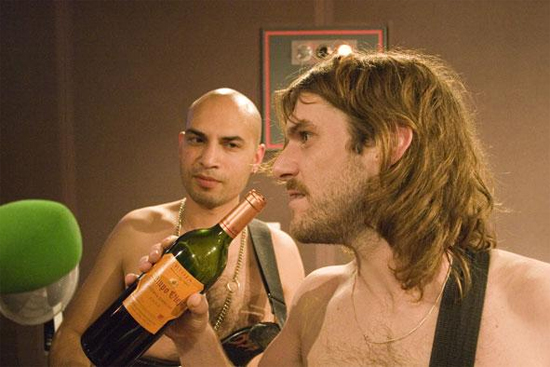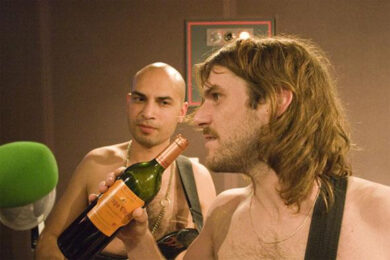“Real men take speed / Real men don’t matter / Real men rarely feel the need to succeed.” These are the first words George McFall intones on God Save the Clean, the debut album by his band Clean George IV. An anti-cocaine song, ‘Real Men Take Speed’ is preceded by a brief, wordless introductory track named ‘Impotence is Bliss’. It ignites an album that teems with caustic epigrams and gems of insight, variously soundtracked by twitchy Devo-esque post-punk, portentous ‘70s metal and bagpipe-guitar solos of a type not heard since Big Country’s heyday. God Save the Clean achieves a daunting feat by being as satisfying as the album taster delivered in March: a video for ‘Pets in the Blitz’.
Its title was a legacy of McFall’s abandoned musical about domestic animals in wartime and drunk young Scottish men in contemporary London. ‘Pets in the Blitz’, however, is a litany of Situationist-style slogans: power in destruction, glamour in upheaval, rock amongst the rubble, nightclubs and cathedrals. But its chorus is improbably tender: “One day, when this is Pompeii, we’ll look back and we will say, ‘I’m so glad that I was with you when it happened.’” In the video, McFall’s words are accompanied by images of fire, destroyed buildings and people getting their heads kicked in on British streets. Here was a dramatisation of the summer riots, released before they even happened.
It is a decade since George McFall first crossed the radar, when his band Serial POP released the Fuck You Jack We’re Fireproof EP, followed a couple of years later by an album, White Sex Male. After Serial POP split, McFall did a stint in The White Sport’s live line-up before half of that band joined Babyshambles. In 2007, Clean George IV released a debut single named after a John Knox poem, ‘First Blast of the Trumpet against the Monstrous Regiment of Women’. Not long afterwards, the band fell silent for four years. McFall ping-ponged between London and the city where he was reared, Edinburgh (or, as he calls it, “does-your-head-in-burgh”). He toured with Liverpudlian drone troupe Kling Klang. He co-wrote and co-produced a Dead Kids album, ‘Dark Party’. But his own album remained in limbo.
“I didn’t really want to finish it for ages,” says McFall, across a table in a Hackney Wetherspoon’s. It’s Friday, and he’s somewhat the worse for wear. Proceedings have not yet reached the point at which pub security decides that he will be leaving after his drink is finished. But that point will be reached, before 8pm. “I thought it was a ridiculous thing to do with one’s time,” he continues. “It’s a popularity contest at the end of the day, and it’s a very embarrassing one. There’s nothing I like better than spending eight hours by myself in a little room programming weird music, but the whole fucking ‘going out and trying to have sex with girls’ thing, I’m not into it. I think it’s weird.”
It’s not just bands who do that stuff though.
“It’s true. Normal people do that too. Normal people have sex with girls, all the time.”
McFall is cynical about sex: “Comparing it to drink and drug abuse, I think it’s arguably worse for creativity.” He is cynical about men: “The worst thing about men is that they’re constantly trying to fuck things.” He is cynical about young people: “In the 1990s, we used to go to indie gigs, and everybody else used to take Es and dance to techno music, and now the youth of today are trying to emulate both of those things at the same time. It’s weird.” And he is cynical about live performance: “It’s hard enough having to write lyrics, but then to have to go into a public arena and act out your lyrics with your hands or with your eyebrows. That’s fucking weird. And it’s arguably not very cool.”
So how did he overcome all-encompassing pessimism to complete ‘God Save the Clean’? It apparently had a lot to do with the help forthcoming from two recording engineers named Tom – bandmate Tom Morris, and brother Tom McFall, a Serial POP veteran who has engineered records by REM, Snow Patrol and various other big hitters.
“I kind of had to finish that record in order to make the people I was making that record with believe that I can finish a record,” says McFall. "My new thing is not having to rely on any other human being. I’ve fallen out with my brother so badly over the mixing. We’re into different music, you see. My brother actually, genuinely, through choice, listens to contemporary music. It’s just insanity.”
It is easy to see why McFall might be disdainful of peer bands. He is, after all, careful to set himself apart by writing lyrics of literary quality. It is no accident. “I think the reason why it took a long time was I didn’t want to write shit lyrics, and at the time my day-to-day life was quite boozy, druggy. It takes a lot longer to write good lyrics if you’re in that state.”
Discussing ‘Real Men Take Speed’, McFall is self-effacing. It is, he says, “Yet another British song about the class system. I guess I’m saying that people who take coke are fucking dickheads.” Was he ever a coke monster himself? “Of course. Not a monster, but I am a dustbin – a drug dustbin.”
Elsewhere on the album is a disquisition on the unlikely social habits of fishermen, ‘The Great Highland Crack Epidemic’ – “Kids speak metric north of Forth,” apparently. Then there is ‘Cecilia’. Named after a road in Dalston, east London, this one is about “long-term cohabitation” and “not wanting to have a girlfriend”. “I’m a useless romantic,” he admits. “But I am a romantic, at the end of the day. I entertain the thoughts.”
Still, the take on relationships offered by ‘Cecilia’ is a brutally negative one: “People to do, offers to take, in a house of love there’s a lot to hate,” sings McFall. Elsewhere, ‘London Scotland’ delivers an equally devastating observation: “Nowhere’s ever good enough for underachievers like us.” And ‘Fat = Dead’ brings with it the piercing perception that “Most fingers on the pulse belong to people on the brink”.
Probably the album’s darkest song, ‘Fat = Dead’ finds McFall spitting out instructions like “return to slender” and “hang yourselves”. But the vituperation suddenly gives way to a rush of sentimentality, in which he exhorts: “In the towns that you live in, with the times that you’re given, do your best…”
Here, he is “trying to be kind”, he says. And there are some things that this misanthrope holds dear. That is made plain during a conversation in which he segues from enthusing about Miley Cyrus’s song ‘Party in the USA’ to bemoaning the critical focus on “a very specific part of middle-class creativity. I don’t think that’s the future.”
What is the future?
“Well, the future is pop music. Pop music has always been the future.”
God Save the Clean is released on 28 November through Tenement Records




